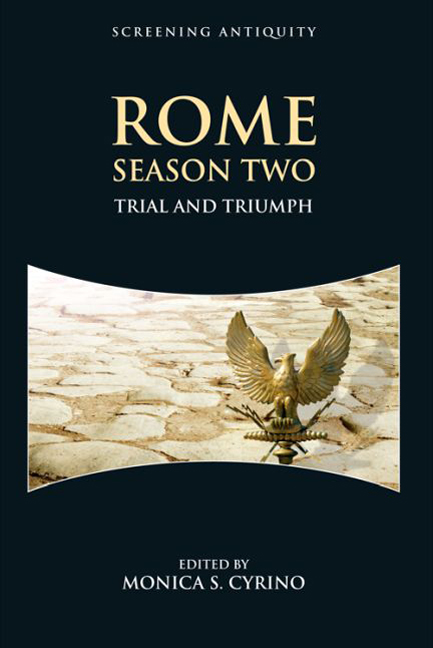Book contents
- Frontmatter
- Contents
- Series Editors’ Preface
- Editor's Acknowledgments
- Contributors
- List of Illustrations
- Episode Listing
- Cast List
- Introduction: The Trials and Triumphs of Rome, Season Two
- PART I POWER AND POLITICS
- PART II Sex and Status
- 8 Revenge and Rivalry in Rome
- 9 Effigies of Atia and Servilia: Effacing the Female Body in Rome
- 10 Livia, Sadomasochism, and the Anti-Augustan Tradition in Rome
- 11 Windows and Mirrors: Illuminating the Invisible Women of Rome
- 12 Antony and Atia: Tragic Romance in Rome
- 13 Problematic Masculinity: Antony and the Political Sphere in Rome
- 14 Rome, Shakespeare, and the Dynamics of the Cleopatra Reception
- 15 The Rattle of the Sistrum: “Othering” Cleopatra and Egypt in Rome
- 16 Gateways to Vice: Drugs and Sex in Rome
- 17 Slashing Rome: Season Two Rewritten in Online Fanfiction
- Filmography
- Bibliography
- Index
9 - Effigies of Atia and Servilia: Effacing the Female Body in Rome
from PART II - Sex and Status
Published online by Cambridge University Press: 07 October 2017
- Frontmatter
- Contents
- Series Editors’ Preface
- Editor's Acknowledgments
- Contributors
- List of Illustrations
- Episode Listing
- Cast List
- Introduction: The Trials and Triumphs of Rome, Season Two
- PART I POWER AND POLITICS
- PART II Sex and Status
- 8 Revenge and Rivalry in Rome
- 9 Effigies of Atia and Servilia: Effacing the Female Body in Rome
- 10 Livia, Sadomasochism, and the Anti-Augustan Tradition in Rome
- 11 Windows and Mirrors: Illuminating the Invisible Women of Rome
- 12 Antony and Atia: Tragic Romance in Rome
- 13 Problematic Masculinity: Antony and the Political Sphere in Rome
- 14 Rome, Shakespeare, and the Dynamics of the Cleopatra Reception
- 15 The Rattle of the Sistrum: “Othering” Cleopatra and Egypt in Rome
- 16 Gateways to Vice: Drugs and Sex in Rome
- 17 Slashing Rome: Season Two Rewritten in Online Fanfiction
- Filmography
- Bibliography
- Index
Summary
The first season of the highly acclaimed television series Rome unfurled the feud between Atia and Servilia by emphasizing the transformation of Servilia's body into the body politic. Rome's first season depicted Servilia, the former lover and then staunch enemy of Julius Caesar, pushing her son, Brutus, against the dictator, under the pretext of liberating the Republic and thus honoring his family tradition of tyrannicide, a tradition that goes back to his namesake ancestor in the sixth century bc. This chapter explores the role of female sexuality in the second season of Rome and demonstrates that Atia's and Servilia's bodies are shown to be used and abused, as the viewer witnesses the desexualization of these main female protagonists.
Undoubtedly, both women experience tremendous personal bereavement in Season Two that reflects on their loss of both political power and momentum: Servilia's son, Brutus, dies in battle, and she commits suicide asking for revenge in front of Atia's house, while Atia herself loses Antony forever to Cleopatra. The matriarch of the house of Octavian is now spurned by her former lover in Egypt and returns to Rome desolate, soon to experience her own son's triumph; this triumph, however, only emphasizes how Atia has ultimately been “defeated” by her own son, who will now officially be called Augustus. Servilia's death figuratively underscores and prefigures Atia's own “demise” as well, as the latter's power will be displaced from now on by the ambitions of an emerging young wife, Livia.
At the same time, this transformation of the two main female characters of the series into powerless “effigies” in Season Two highlights Octavian's control over the female body. The grown-up Octavian transforms the female body into a locus of political manipulation: when he addresses a group of women in episode 20 (“A Necessary Fiction”), Octavian is offering a history lesson on Rome's men and on old-fashioned Roman mores, traditionally upheld by the virtuous women of Rome's past. Octavian thereby “fetishizes” the female body by turning it into a controllable medium, on to which the future of the Empire under the Principate will be mapped. The control and manipulation of female sexuality by the princeps announces a new type of regime, a rather more conservative and phallocentric one, in which the Eastern otherness of Mark Antony and Cleopatra are no longer viable.
- Type
- Chapter
- Information
- Rome Season TwoTrial and Triumph, pp. 117 - 127Publisher: Edinburgh University PressPrint publication year: 2015

